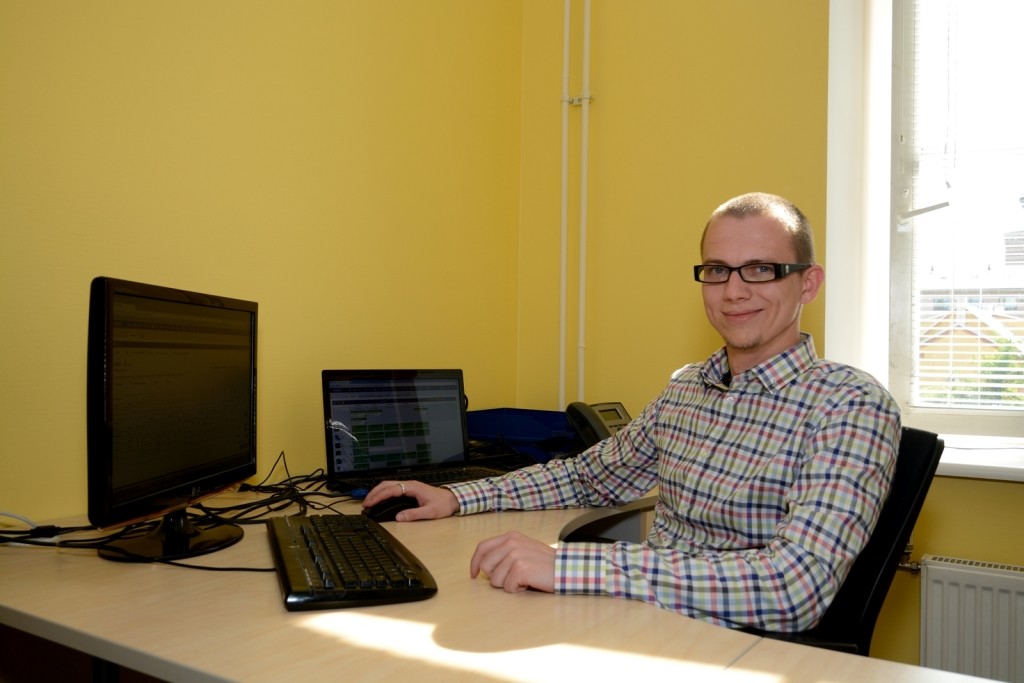PARiM is a human resource planning and management application based in the cloud. It is designed for companies who provide human resources as a service to different clients. Typical users of the PARiM HRM software are companies in the following industries: security, maintenance, cleaning, building, facility management. PARiM Limited is an Estonian-run UK company which is headquartered in London, but with a development office based in Tartu, Estonia. Cofounder Risto Urb, CTO of PARiM, answered our questions.
II
How did the idea of starting your business come about?
When I first arrived in London, Riko (Riko Muttik, the other cofounder and CEO of PARiM) and I had our separate agendas. Riko was running a small custom software development company and I started to work as a professional software developer. After a couple of months discussing business and IT in general over some pints, we came to a realisation that our visions, ideas and backgrounds were quite similar and complementing each other. So we decided to act upon this revelation. We started to develop custom software together with the clear goal of eventually moving into product development. Now we are developing our own business-to-business HR management and shift planning software-as-a-service called PARiM.
What is your business model?
PARiM enables our customers to provide HR services to their clients more effectively and with greater transparency. By providing self-service and mobile access to clients and workers of our customers, we reduce significantly their organisational overhead. Our admin area for office workers is designed and built so that business support activities like creating and maintaining shifts, worksheets, calendars is as user friendly and automated as possible. We charge based on how much business is done via our system. Each shift hour sold by our customers to their respective clients is generating revenue for them and that volume of hours inside our system is the basis for our own revenue. So our own business is totally dependent on the business we help our customers do. This means that our on-going product development is done solely based on very carefully listening to our customers and their needs.
What would you say was the hardest part of starting the business?
Finding the right people to join our team after the initial start. We are very demanding on ourselves trying to do the best we can in all aspects of the business and we expect a similar attitude from others. We like to think of ourselves as determined professionals and we value people who can relate to that. People, who are able to push themselves to find solutions to problems and make decisions. People who value the feeling of accomplishment after a hard days’ work in addition to their pay cheque at the end of the month.
Where are you based and why?
We have management and sales in London and product development in Tartu. The reason for this is quite obvious – the UK has the market and Tartu the technical delivery capabilities. And by technical delivery capabilities I mean people who are able to think along and ahead. It’s relatively easy to find a programmer in the UK, but if you are looking for a developer, then Estonia is the place to go.
How were you able to fund the business?
At first we had custom software development to support our product development activities, but that turned out to be too obstructive to the end goal. So after pretty much scrapping the custom development we have funded the whole operation from our own savings and from the contributions of relatives, friends and other supporters. We also collected a UK government-backed start-up loan this spring.
Could you briefly describe the founding team and their background?
We are both University of Tartu alumni in computer science. That is actually where we first met and became friends. Riko has been an entrepreneur in different areas pretty much since he finished high school. He was hardened by the economic boom and the collapse that followed it. I worked for six years in Nortal as a developer, consultant and unit manager. So I got pretty much all of the software development, maintaining and sales cycle covered as a working professional.
How has your market changed since you started? How has your business changed to keep pace?
Our market has not really changed that much; what has changed is our approach to the market. Our general HR system product is at the moment mainly targeted towards the security industry. This is so we can focus sales in one sector before tackling all the rest.
What was the minimum viable product (MVP) you built and if/how it has changed?
For us the MVP goal was clear, the product had to support organisations that provide HR services to a pool of around 50 workers. This was to limit our initial customer base to either starting companies or companies with less complex internal processes, which enabled us to enter the market as soon as possible and to grow with our customers. This approach has brought us more invaluable feedback from users than we ever expected. The MVP has not changed radically, but there is now truly clear insight in what we need to improve and add to reach the next level.
Do you have governmental subsidy to operate your business?
No, not directly. We did get a start-up loan backed up by the UK government but we have not received any direct subsidies from governments. To be totally honest, we have not applied for any, due to our calculations regarding the hassle and losing of focus versus return. Our greatest assets are our people and their time so we do our best to use everyone and their skills where it most benefits the company.
What is an average workday like for you?
For me personally, it is to come to the office, overview current development status, discuss with the team where we are, what and in what order to do next and then just do what we have agreed upon. My role is very development-focused. Riko has a quite different day. His day includes similar status checks in sales, building up a rapport with customers, collecting insights about the product on customer sites – so totally customer facing and sales oriented. Although I am in Tartu most of my time and he is London, we are constantly in touch each day to make sure that our product is providing the best possible additional value to our customers.
How is your company different from other competing and similar platforms out there?
At the moment not one of our competitors is providing this level of insight to all parties involved in doing business in our target market. Our user experience is also unique. The way our application environment is created to implement real life thought patterns and business processes as seamlessly as possible into the user experience. There are really cool technologies out there that enable us to create possibilities that make the usage of business software much less dull while improving productivity.
What could you say has been some of the key things you’ve learnt so far as an entrepreneur?
Doing is everything. You need to plan and revise your plans constantly but at the same time you need to accept the fact that while you plan, life happens. Everything is in a state of constant movement. So changes are inevitable and errors are inevitable. If you have a clear goal, put down a path on how to get there and just start going towards it. If this is your first experience as entrepreneur, like it is for me, it is going to be hard but rewarding in ways you can not yet imagine. Choose the people around you wisely to match the rest of the team. Respect and trust your team members and together you will conquer every obstacle.
What trends, start-ups and technology are you personally looking forward to in 2013?
In our neighbourhood it is all about near-live or live feed data. There are many very interesting technologies that are becoming more and more mature to accomplish these goals with reduced risks and lower development overhead to implement them. Personally I am most interested in Estonian start-ups that have a great idea and execution – for example TransferWise and of course big-boy battles between Google, Amazon and Microsoft that produce more universal and robust platforms for businesses like ours.
What pieces of advice could you give to aspiring entrepreneurs out there looking to start their business?
Same things mentioned in key things that we have learned. The only way to certainly fail is not to try at all. And while you chase your dreams, do not forget to cherish the people closest to you.
Where do you see your business in five years’ time?
To be the industry standard in UK and a choice not to be overlooked by anyone further away.
I
Expert comment
Taavi Raidma, Founder and CEO at CrowdIPR:
PARiM is after a lucrative market, but certainly not an easy one to tackle — enterprise sales cycles are complex and many organisations are quite resistant to change. Yet with the increasing shift from traditional software to cloud and mobile solutions, the global opportunity for the company is massive. The product looks clean and with pleasant design, and the user experience is intuitive — a significant upgrade from many of the existing alternatives out there. Most importantly, Riko and Risto both hold extensive technical, as well as commercial experience, giving them a good chance of success.
I
Photos: PARiM/Wikimedia Commons



